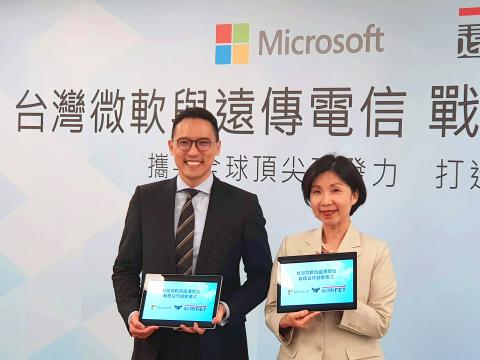Far EasTone Telecommunications Co Ltd (遠傳電信) yesterday signed a memorandum of understanding with Microsoft Corp as the nation’s third-largest telecom looks to provide its clients with enterprise solutions and services through the Microsoft Azure cloud-computing platform.
Taipei-based Far EasTone last year set up a “new economy” office with a team focused on digital transformation in an attempt to boost revenue through businesses related to big data, artificial intelligence and the Internet of Things as revenue from traditional telecom services remains on a downward trend, the company said.
“We currently have 60 to 70 employees in this team,” Far EasTone president Chee Ching (井琪) told reporters on the sidelines of the signing ceremony.

Photo: CNA
The company is looking to expand the “new economy” office by recruiting more talent, which Ching expects to comprise up to 30 percent of the company’s technical operations branch that accounts for 49 percent of overall employees.
“We would recommend Microsoft products, such as communication tools, to our clients as part of our cooperation, but when it comes to software development … our operations technicians have the capacity [to develop],” she said, adding that each solution would be customized based on the client’s needs.
“While most people still know us as a SIM card provider … we are now working on providing digital services in three categories — retail, manufacturing and medical care,” Ching said.
Far EasTone is cooperating with Shin Kong Wu Ho-Su Memorial Hospital on system integration using Microsoft services, she said.
The telecom has previously cooperated with Far EasTone Memorial Hospital on various clinical Internet of Things applications.

Taiwan Transport and Storage Corp (TTS, 台灣通運倉儲) yesterday unveiled its first electric tractor unit — manufactured by Volvo Trucks — in a ceremony in Taipei, and said the unit would soon be used to transport cement produced by Taiwan Cement Corp (TCC, 台灣水泥). Both TTS and TCC belong to TCC International Holdings Ltd (台泥國際集團). With the electric tractor unit, the Taipei-based cement firm would become the first in Taiwan to use electric vehicles to transport construction materials. TTS chairman Koo Kung-yi (辜公怡), Volvo Trucks vice president of sales and marketing Johan Selven, TCC president Roman Cheng (程耀輝) and Taikoo Motors Group

Among the rows of vibrators, rubber torsos and leather harnesses at a Chinese sex toys exhibition in Shanghai this weekend, the beginnings of an artificial intelligence (AI)-driven shift in the industry quietly pulsed. China manufactures about 70 percent of the world’s sex toys, most of it the “hardware” on display at the fair — whether that be technicolor tentacled dildos or hyper-realistic personalized silicone dolls. Yet smart toys have been rising in popularity for some time. Many major European and US brands already offer tech-enhanced products that can enable long-distance love, monitor well-being and even bring people one step closer to

RECORD-BREAKING: TSMC’s net profit last quarter beat market expectations by expanding 8.9% and it was the best first-quarter profit in the chipmaker’s history Taiwan Semiconductor Manufacturing Co (TSMC, 台積電), which counts Nvidia Corp as a key customer, yesterday said that artificial intelligence (AI) server chip revenue is set to more than double this year from last year amid rising demand. The chipmaker expects the growth momentum to continue in the next five years with an annual compound growth rate of 50 percent, TSMC chief executive officer C.C. Wei (魏哲家) told investors yesterday. By 2028, AI chips’ contribution to revenue would climb to about 20 percent from a percentage in the low teens, Wei said. “Almost all the AI innovators are working with TSMC to address the

Malaysia’s leader yesterday announced plans to build a massive semiconductor design park, aiming to boost the Southeast Asian nation’s role in the global chip industry. A prominent player in the semiconductor industry for decades, Malaysia accounts for an estimated 13 percent of global back-end manufacturing, according to German tech giant Bosch. Now it wants to go beyond production and emerge as a chip design powerhouse too, Malaysian Prime Minister Anwar Ibrahim said. “I am pleased to announce the largest IC (integrated circuit) Design Park in Southeast Asia, that will house world-class anchor tenants and collaborate with global companies such as Arm [Holdings PLC],”